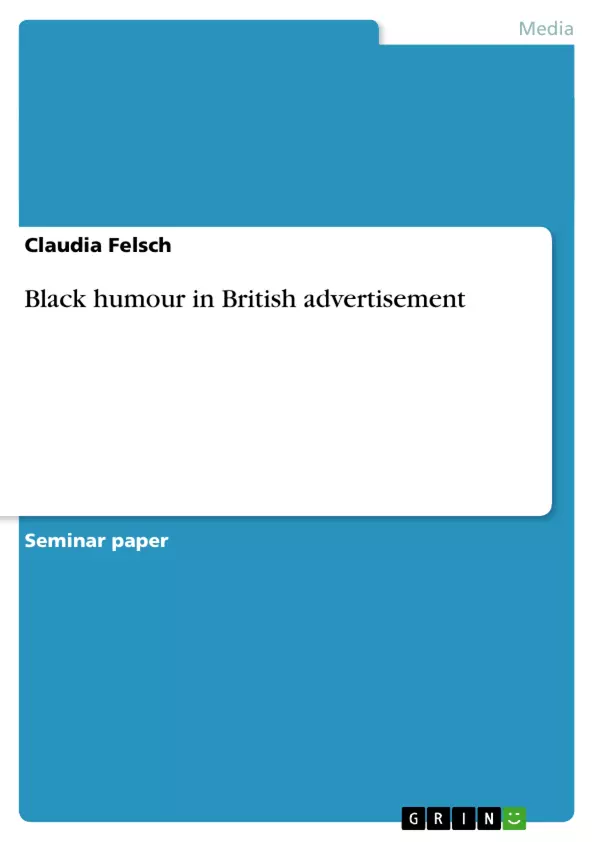As everyone knows humour plays a decisive role in conversations. Particularly in Great Britain black humour is used as the medium of communication. People’s attitudes towards humour in advertisements are completely different. Naturally advertisement appears artificial and unreal. Due to the wittiness that is now to be used easily an advert obtains its target more effectively.
After this brief introduction I want to show facts that are important to know about black humour and black comedy. It will be mentioned its development with the generations and its appearance in British advertisement. Another point will be to expose cultural and legitimate aspects concerning humour and advertisement.
At the end I will attach an example of a British television spot of Levi’s 501 jeans with a reference to typical facts of British advertisement you will find in it.
Inhaltsverzeichnis (Table of Contents)
- Introduction
- Black Humour and Black Comedy
- Black people on television adverts
- Humour under cultural and lawful aspects
- Different attitudes towards humour
- Terms and conditions of advertisement
- Example: Levis - a television advert
- Conclusion
Zielsetzung und Themenschwerpunkte (Objectives and Key Themes)
This paper examines the use of black humour in British advertisement. It explores the development of black humour and its role in television commercials, focusing on its origins and evolution. The paper also analyzes the cultural and legal aspects of humour in advertising, considering varying attitudes towards humour and the regulations surrounding it. Finally, the paper examines a specific example of a Levis television advert, highlighting how it exemplifies the key characteristics of British humour in advertisement.
- The evolution of black humour and its application in British advertising
- Cultural and legal considerations regarding humour in advertising
- The relationship between humour and effectiveness in advertising
- The use of black humour in television commercials
- Analysis of a specific example of a British television advertisement
Zusammenfassung der Kapitel (Chapter Summaries)
- Introduction: This chapter provides a brief overview of the significance of humour in communication, particularly in the context of British advertising. It establishes the key areas of focus for the paper, namely the exploration of black humour and its cultural and legal implications in advertising.
- Black Humour and Black Comedy: This chapter defines and explores the concept of black humour and its close relationship with black comedy. It discusses the origins of the term, different types of humour, and the common themes found in British comedy, including satire and the exploration of social aspects.
- Black people on television adverts: This chapter focuses on the representation of black people in television advertisements and how humour is employed in this context. It examines the potential for misunderstandings and the importance of cultural sensitivity when using humour.
- Humour under cultural and lawful aspects: This chapter delves into the cultural and legal dimensions of humour in advertising. It examines the different ways humour is perceived and understood across cultures, and discusses the specific regulations and legal considerations that govern advertising practices.
- Example: Levis - a television advert: This chapter presents a detailed analysis of a specific Levis television advertisement, highlighting how it incorporates elements of British humour and aligns with the key themes explored in the paper.
Schlüsselwörter (Keywords)
The primary keywords and focus topics of this work include black humour, black comedy, British advertising, television commercials, cultural sensitivity, legal regulations, and humour in advertising. The paper examines these concepts through the lens of cultural differences, communication strategies, and advertising effectiveness.
- Citar trabajo
- Claudia Felsch (Autor), 2004, Black humour in British advertisement, Múnich, GRIN Verlag, https://www.grin.com/document/29900



